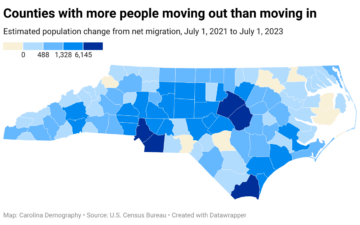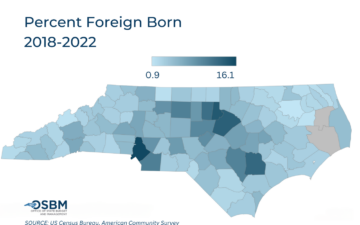In 2020, the NC Counts Coalition provided funding to more than 60 NC-based organizations working to reach the communities most at-risk of being undercounted in the 2020 Census.
The Coalition had previously worked with Carolina Demography to create a map identifying the communities across the state that could be hard to count in the 2020 Census. They used this map to identify their priority areas and make funding decisions.
As Census collection efforts began, they wanted us to provide their grant recipients with real-time information about Census counts in their targeted communities so that they could better target their efforts and understand how to allocate their limited resources.
Approach
We identified the type of information that would be most useful for communications and outreach organizations throughout the state. They needed to know, at the county and census tract level, who was responding and not responding to the 2020 Census, and how different targeted groups were responding each week.
We developed a weekly email summary, report, and social media cards to share this information. In addition, we realized many people across the state — in addition to the NC Counts Coalition’s grant recipients — would benefit from having this information about their county response rate. Scaling these efforts across all 100 counties provided county officials and key Census outreach communities with detailed guides to target and prioritize high-risk communities.
Our weekly summary reports were distributed through our website, social media, and our newsletter, which reaches over 8,000 key stakeholders across the state.
Impact
Our Census reports were widely read and helped target efforts to increase North Carolina’s 2020 Census response rate. The newsletter also resulted in dozens of media mentions across the state as reporters used our weekly Census reports to write pieces for their local communities.

Last week, the U.S (United States). Census Bureau released 2023 county population estimates. These annual estimates tell us how county populations in North Carolina have changed over the course of a year: in this case, between July 1, 2022 and…

Deciding which educational pathway to pursue is often a daunting decision for a high schooler transitioning to postsecondary education. There are many questions a student must ask. Do I want to pursue a credential or a degree awarding program? What…

Dr. Michael Cline is the state demographer for North Carolina at the Office of State Budget and Management and has given us permission to re-post his content here. The original version of this piece is here. The foreign-born population in…
Your support is critical to our mission of measuring, understanding, and predicting population change and its impact. Donate to Carolina Demography today.